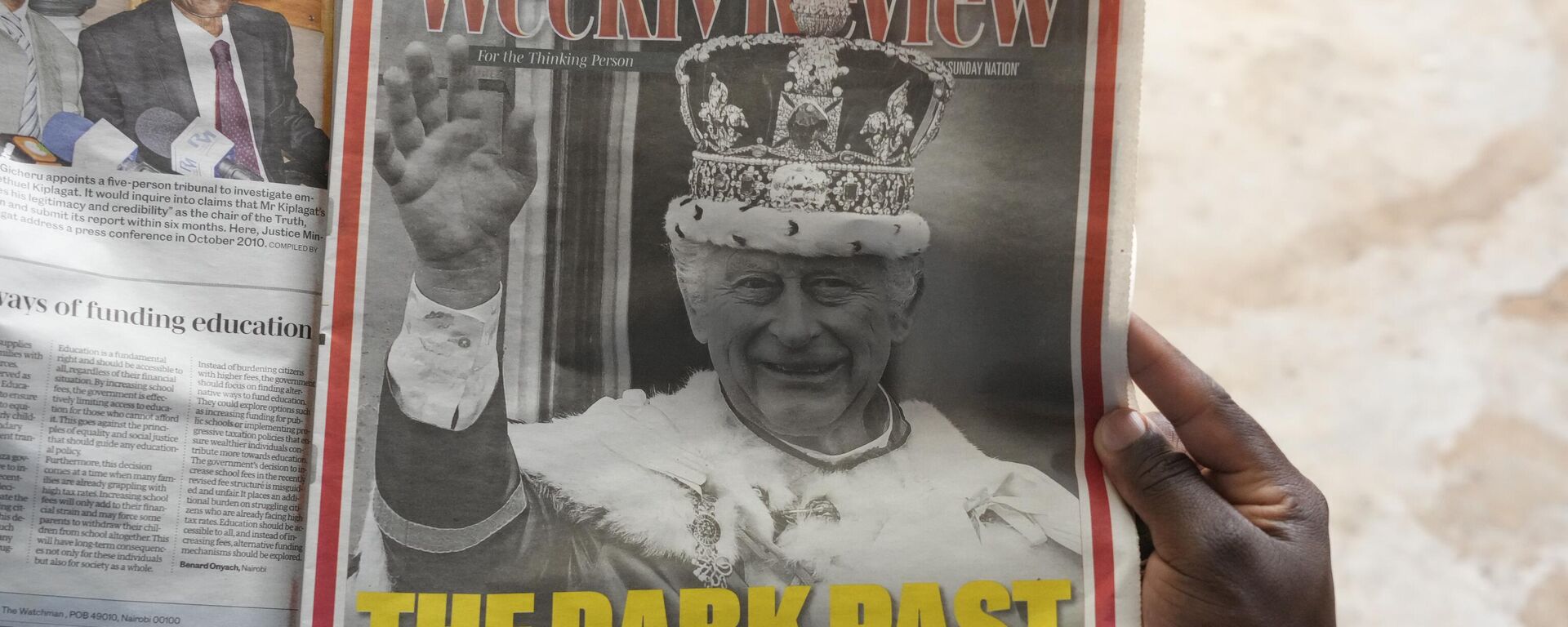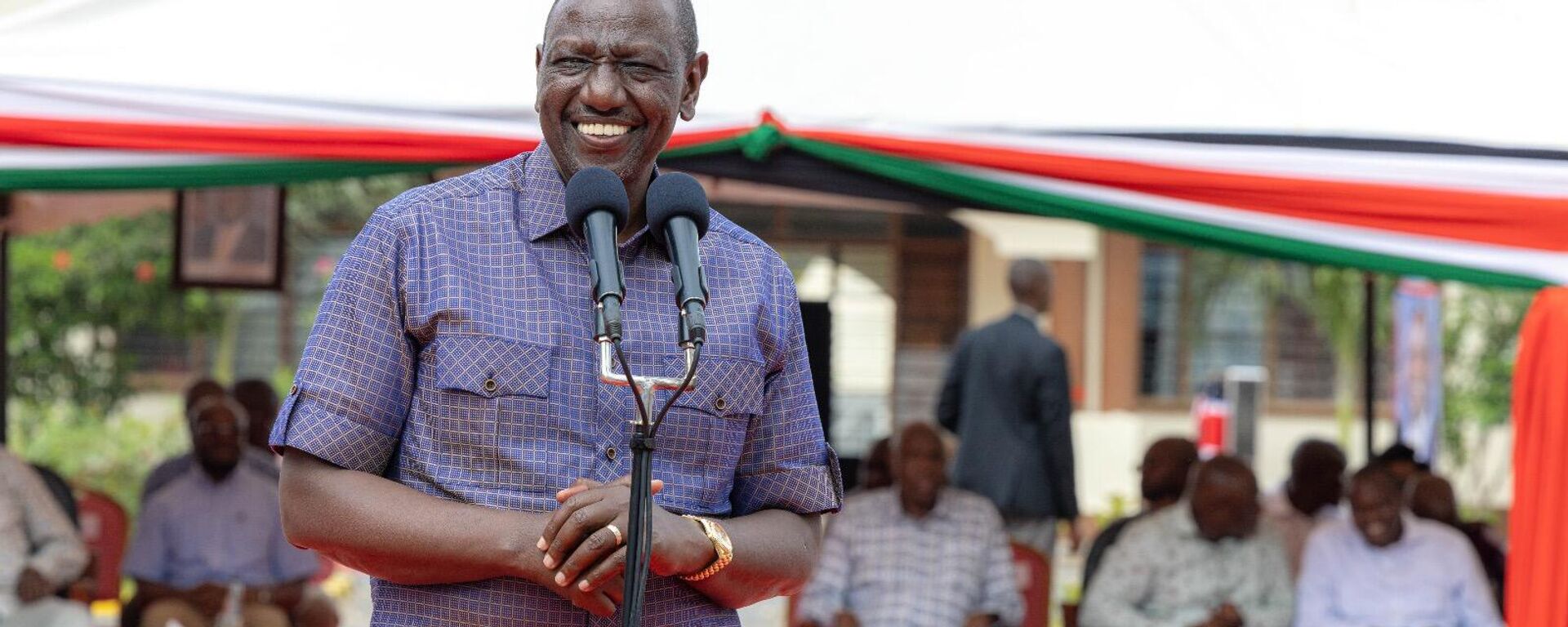https://en.sputniknews.africa/20231102/apologies-wouldnt-be-helpful-analysts-on-king-charles-iiis-regrets-to-kenya-1063262072.html
'Apologies Wouldn't Be Helpful': Does Kenya Need King Charles III's 'Regrets'?
'Apologies Wouldn't Be Helpful': Does Kenya Need King Charles III's 'Regrets'?
Sputnik Africa
On November 1, during a visit to Kenya, King Charles III of the United Kingdom expressed regret over British colonial-era policies in Kenya. Sputnik Africa... 02.11.2023, Sputnik Africa
2023-11-02T17:48+0100
2023-11-02T17:48+0100
2023-11-03T12:01+0100
opinion
king charles iii
international
kenya
united kingdom (uk)
east africa
africa in details
https://cdn1.img.sputniknews.africa/img/07e7/0b/02/1063264987_0:160:3072:1888_1920x0_80_0_0_309cf268b6593522d5750d3c187c3af3.jpg
What Kenyans wanted from King Charles III was not an apology for the British colonial atrocities against the East African nation, but the return of stolen resources, as well as other practical measures, Professor Fredrick Onyango Ogola, Kenyan governance and economic expert, told Sputnik Africa.The expert stated that he would only be interested if "the pain caused was reversed" and the depleted resources were returned. Furthermore, he pointed out that the UK takes pride in its history as a colonial master and the accomplishments it obtained through colonization, which is deeply embedded in the country's culture. Hence, according to the expert, an apology from the British monarch is not the ideal course of action.The researcher also lambasted Britain's colonial legacy towards the East African nation. Kenyans believe that the colonial master divided the country along tribal lines, which "affects us hugely in our electoral system, in our governance system, in all our life in Kenya." Onyango Ogola cited the example of Kenya's Luo people, who expressed grave concerns about the killings in Solu in the country's west. Ogola argues that the root cause behind these tragic fatalities is the lack of knowledge and understanding about the territorial boundaries separating different tribes in the area.Meanwhile, the professor noted the usefulness of the British monarch's visit, as it compelled Raila Odinga, the leader of the opposition party Azimio la Umoja (One Kenya), to make an appearance at State House alongside President William Ruto. Odinga has been organizing protests against the exorbitant prices of food, fuel, and electricity in the nation, as well as the outcomes of the 2022 elections, which resulted in William Ruto assuming the presidency.Dr. Michael Owiso, Dean, School of Development and Strategic Studies, Maseno University, Kenya, in turn, told Sputnik Africa that the need for the UK to apologize was identified by the Truth Commission, established in Kenya in 2007. However, he noted that King Charles III's apology could have been "a bit more structured."Isaac Yitzhak Mosbey, Kenya's Nandi county Assembly leader and former chairman of a trade union, commented on King Charles' remarks, calling them "cautiously tailored to steer clear of politics and the dark past between Kenya and the UK."Current ChallengesSpeaking about the current bilateral relations, Professor Onyango Ogola noted that the UK treats Kenya "as if we have no relationship in the issue of migration, customs and trade." He cited his experience, saying that he did his doctorate in Spain rather than the UK because it was easier to get a visa there.The analyst also questioned educational cooperation between Kenya and the UK, casting doubt on the existence of a platform for exchange between students and professors to "help grow the economy."On a more global scale, the expert outlined the current state of international relations. According to his research, capital is transferring and Kenya and developing countries "are actually the ones financing the developed countries."
https://en.sputniknews.africa/20231030/uk-never-intended-to-get-rid-of-its-colonial-legacy-prof-on-uk-kenya-controversial-ties--1063195105.html
https://en.sputniknews.africa/20231030/around-the-world-in-one-term-kenyas-ruto-explains-his-frequent-foreign-visits-1063192124.html
kenya
united kingdom (uk)
east africa
Sputnik Africa
feedback@sputniknews.com
+74956456601
MIA „Rossiya Segodnya“
2023
Maxim Grishenkin
https://cdn1.img.sputniknews.africa/img/07e7/0a/17/1063018107_0:0:1104:1103_100x100_80_0_0_03090c85a11f5d2e8a19cf1d989443c9.jpg
Maxim Grishenkin
https://cdn1.img.sputniknews.africa/img/07e7/0a/17/1063018107_0:0:1104:1103_100x100_80_0_0_03090c85a11f5d2e8a19cf1d989443c9.jpg
News
en_EN
Sputnik Africa
feedback@sputniknews.com
+74956456601
MIA „Rossiya Segodnya“
Sputnik Africa
feedback@sputniknews.com
+74956456601
MIA „Rossiya Segodnya“
Maxim Grishenkin
https://cdn1.img.sputniknews.africa/img/07e7/0a/17/1063018107_0:0:1104:1103_100x100_80_0_0_03090c85a11f5d2e8a19cf1d989443c9.jpg
king charles iii, international, kenya, united kingdom (uk), east africa, africa in details
king charles iii, international, kenya, united kingdom (uk), east africa, africa in details
'Apologies Wouldn't Be Helpful': Does Kenya Need King Charles III's 'Regrets'?
17:48 02.11.2023 (Updated: 12:01 03.11.2023) On November 1, during a visit to Kenya, King Charles III of the United Kingdom expressed regret over British colonial-era policies in Kenya. Sputnik Africa asked experts to shed light on what the monarch's remarks mean for Kenyans.
What Kenyans wanted from King Charles III was not an apology for the British colonial atrocities against the East African nation, but the return of stolen resources, as well as other practical measures, Professor Fredrick Onyango Ogola, Kenyan governance and economic expert, told Sputnik Africa.
"If the British people depleted the Kenyan economy and that's how they built this mega-empire called the United Kingdom, and they're just coming to tell us 'we are sorry', I do not think as an economist, as a governance expert, that's something that Kenyans are going to look forward to, Onyango Ogola noted. "An apology wouldn't even be helpful."
The expert stated that he would only be interested if "the pain caused was reversed" and the depleted resources were returned.
Furthermore, he pointed out that the UK takes pride in its history as a colonial master and the accomplishments it
obtained through colonization, which is deeply embedded in the country's culture. Hence, according to the expert, an apology from the British monarch is not the ideal course of action.
"If you go to the [London] palaces, there's even a history of colonialism and history told with pride that they [the UK] colonized Africa, other parts of the world, and they are proud of it. So telling us sorry is not the idea that is ideal here," Onyango Ogola remarked.
The researcher also lambasted Britain's colonial legacy towards the East African nation. Kenyans believe that the colonial master divided the country along tribal lines, which "affects us hugely in our electoral system, in our governance system, in all our life in Kenya."
Onyango Ogola cited the example of Kenya's Luo people, who expressed grave concerns about the killings in Solu in the country's west. Ogola argues that the root cause behind these tragic fatalities is the lack of knowledge and understanding about the territorial boundaries separating different tribes in the area.
"Nobody knows the border between the Luos, the Kipsigis, the Nandis, the Kisiis and other tribes there. And they [the Luos] say to me, go and tell the king and the queen to give us the original map [...] so that we can know exactly where these boundaries are so that people don't fight," he said.
Meanwhile, the professor noted the usefulness of the British monarch's visit, as it compelled Raila Odinga, the leader of the opposition party Azimio la Umoja (One Kenya), to make an appearance at State House alongside President William Ruto. Odinga
has been organizing protests against the exorbitant prices of food, fuel, and electricity in the nation, as well as the outcomes of the 2022 elections, which resulted in William Ruto assuming the presidency.
"If the coming of the king was able to bring Raila Odinga together with William Ruto in State House in the presence of the king and shake hands, then for sure that is a good thing, because then Kenyans have to have faith and hope in the economy," the professor opined.
Dr. Michael Owiso, Dean, School of Development and Strategic Studies, Maseno University, Kenya, in turn, told Sputnik Africa that the need for the UK to apologize was identified by the Truth Commission, established in Kenya in 2007.
"We must remember that in Kenya we have gone through a transitional justice moment where we had a Truth Commission [...] And one of the recommendations of the Truth Commission by then was that an apology needed to be made not just by the Kenyan government, but also by the colonial master, the colonial government," Owiso explained.
However, he noted that
King Charles III's apology could have been "a bit more structured."
Isaac Yitzhak Mosbey, Kenya's Nandi county Assembly leader and former chairman of a trade union, commented on King Charles' remarks, calling them "cautiously tailored to steer clear of politics and the dark past between Kenya and the UK."
Speaking about the current bilateral relations, Professor Onyango Ogola noted that the UK treats Kenya "as if we have no relationship in the issue of migration, customs and trade." He cited his experience, saying that he did his doctorate in Spain rather than the UK because it was easier to get a visa there.
"I saw Spain relating much better with the colonies in the South American region," he remarked.
The analyst also questioned educational cooperation between
Kenya and the UK, casting doubt on the existence of a platform for exchange between students and professors to
"help grow the economy."On a more global scale, the expert outlined the current state of international relations. According to his research, capital is transferring and Kenya and developing countries "are actually the ones financing the developed countries."
"Research shows that $3.3 trillion move from developing countries to developed countries, and the other one, $1.3 trillion move from developed countries coming to developing countries. So the West cannot pretend that they are giving us aid," Onyango Ogola concluded.




